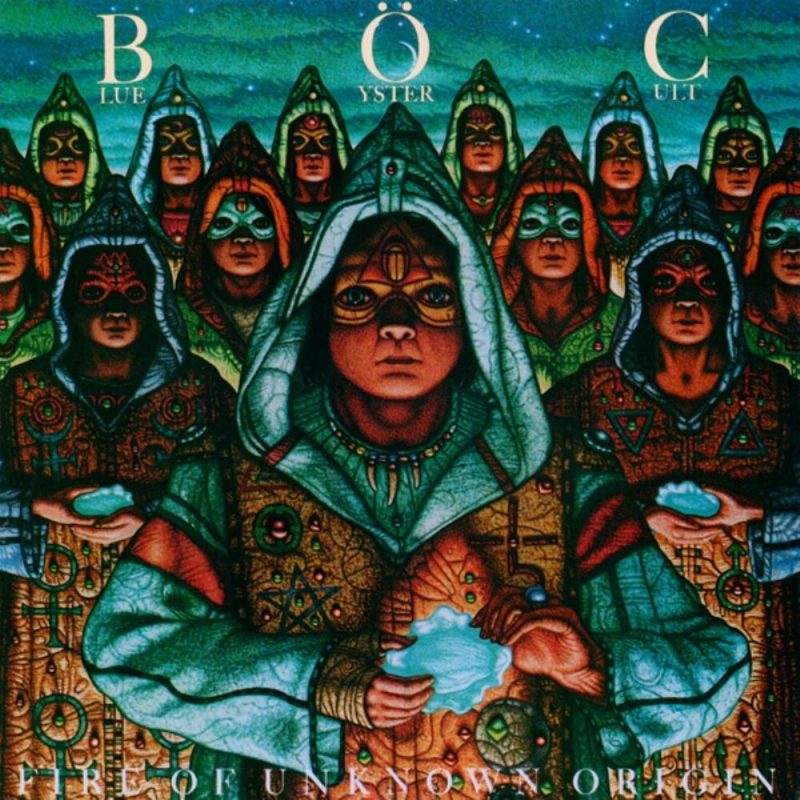If this is a basic bitch album to like, call me a pH 14 female dog, because it’s actually great. Firm handshakes all around!
BÖC’s big “eighties” record achieves something remarkable: it combines the good aspects of several genres while avoiding all of their bad parts. Want heavy metal with no lumbering stupidity? Want progressive rock that’s catchy, immediate, and engaging? Want pop music that isn’t shallow? They do it all. The songs are excellently constructed, well-produced, and as compulsively relistenable as your phone banking password read out by an Indian man with a lisp.
Good songs:
The title track: simple and stately. It sets the stage, carving out the space that BÖC intend to explore (synths, guitars, new wave, NWOBHM). The keyboard presence has been greatly increased since their last album, matching the guitars in cut and heft, and J Bouchard offers a walking bassline that acts as the song’s heartbeat.
“Heavy Metal: The Black and Silver”: a big goofy Manowar kind of track. Presumably it’s one of the ones written and rejected for the Heavy Metal movie soundtrack, but BÖC usually have a song or two like this on every album (“Cities on Flame with Rock and Roll”, etc), where they play into the “heavy metal parody” thing suggested by the umlaut in their name. Gloriously stupid, its Black Sabbath-inspired riffs are crushing, and the call-and-response bridge acts as an interesting counterpoint.
“Sole Survivor”: another Bloom-written piece. I like the keys in the chorus. It does sound a bit too close to “Veteren of the Psychic Wars”, which precedes it in the tracklisting. The intro makes me wonder if J Bouchard double-tracked bass for this song. If so, good on him for keeping it as tight as it is.
Great songs:
“After Dark” is a high-velocity rocker, similar to the material found on Cultus Erectus. Relentless. Dare I say that the chorus has some ska influence?
“Joan Crawford”. A big and anthemic peak near the end of side B, with Grand Guignol horror lyrics that separate from the rest of the album. The significance of Joan Crawford coming back to life is lost on me, but if Jewish carpenters can pull it off, I guess 1930s screwball comedy actresses can, too. Maybe BÖC related to the idea of a one-time hitmaker being relegated to obscurity by career mishaps and changing times…and then escaping her coffin. Either way, the song is musically in good order, ending on a fun little JS Bach reference.
“Don’t Turn Your Back” is constructed from layered, ambiguous chords. Is the song sinister? Happy? It teeters between tones, unwilling to commit itself to a single mood. It’s like that moment in twilight where you’re not sure whether it’s dark or light outside. For a band that relied so much on sledghammer heaviness, this is a clever and thoughtful album closer.
Incandescent songs:
“Burnin’ For You” is a goliath of a track, as good a single as they ever wrote. The song is remorselessly catchy yet loaded with complexity: little ideas swirl and eddy within the larger piece. Harmonized twin guitar leads; a quasi-motorik inspired rhythm similar to what the Cars would do, Buck Dharma’s wild shredding; and Sting-styled vocals. Nearly a perfect song.
“Veteren of the Psychic Wars”. AKA, “My name’s Harry Canyon. I drive a cab.” This is the song that Ivan Reitman finally featured on the 1981 film Heavy Metal. Co-written by Michael Moorcock, it has lyrics that could relate to the Vietnam War, the counterculture, or some fantasy scenario. It’s extremely heavy and epic: again, Manowar’s entire career condensed into one song. The keyboards are tastefully used, and the military-style snare fills shuffling in the chorus are great. “Wounds are all I’m made of!”
“Vengeance (The Pact)” is maybe the album highlight. Albert Bouchard delivers a fantastic synth-driven heavy metal song that sounds like Manilla Road with good singing. The tempo picks up in the bridge, entering a Steve Harris-style Iron Maiden gallop (Martin Birch had just finished with Killers before this, come to think of it, so maybe the similarity is more than accidental). If I had to bitch, the lyrics are a bit heavy-handed and expository, basically describing the plot of Heavy Metal‘s “Taarna” sequence beat for beat. I’m not surprised Reitman didn’t use it. Why score a film with music that literally tells you the plot? Moorcock’s more cryptic approach suits the band better.
BÖC were always a little mismarketed. Their “heavy metal” cred was largely tongue-in-cheek, and they never had the patience to stick with it for long. They were a smart, diverse, creative band, touched by a quintessential strangeness. Whatever made them special, this is basically the last chance to see it. After this, A Bouchard is fired, and the band began a rapid descent into the worst excesses of the 80s. BÖC made many albums after Fire of Unknown Origin, but it remains the oyster’s final great pearl.
No Comments »
Comments are moderated and may take up to 24 hours to appear.
No comments yet.

